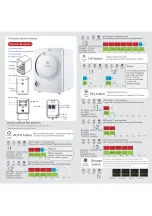
3-9
6600-0255-000
12/20/00
3/Operation
3-9
This alarm recurs every 12 minutes during operation in the manual mode. If the
alarm silence switch is not pressed within 3 minutes of the check patient alarm, an
alternating two tone alarm sounds and the heater is turned off.
The Warmer may be preheated using 0% to 25% power levels. The 12 minute
check patient alarm is not activated within these power level settings.
The skin temperature probe may be used to monitor the patient’s temperature in
the manual mode but it does not control the radiant heat energy level. See step 4
for skin temperature probe attachment.
Note: A patient placed in any warmer will normally develop temperature gradients
with hotter and cooler areas. This is due to radiant heat being applied above the
infant, the cooling effect from the mattress below the infant, the unequal skin
cooling effect from evaporative water loss, unequal internal heat generation within
the patient, and the environmental variables of room temperature, room air move-
ment, incidental sunlight, etc.
4.
Skin Temperature Probe Attachment.
WARNING:
w
Use only the Reusable Ohmeda skin temperature probe (Stock No. 0208-
0697-700) and heat reflective patches (Stock No. 0203-1980-300, 50/pkg)
or the disposable probe (Stock No. 6600-0208-700, 10/pkg; Stock No.
6600-0196-700. 50/pkg) to monitor the patient’s skin temperature. Use of
other manufacturer’s probes may affect the accuracy of warmer operation
and the electrical safety of the patient.
w
The skin temperature probe should be located on the patient’s skin in an
area which is directly in the path of the radiant heat. It should not be
attached to an area which is shielded from the radiant heat or between
the patient and the mattress. Large temperature gradients and very long
servo response times will result from improper probe placement.
w
Rectal temperatures must never be used to servo control a patient’s
temperature.
The Ohmeda Patient probe lead is made from low mass wire that helps prevent
probe detachment while reducing pulling on the neonate’s skin.
Place the metal side of the skin temperature probe on the skin over the liver area of
the infant’s abdomen. Remove the paper protecting the hypoallergenic adhesive on
the Heat Reflective Patch. Secure the skin temperature probe to the patient’s skin
with the adhesive side of the patch (Figure 3-2). Do not remove the heat reflecting
foil which must be facing up.
Note: The probe jack is attached at a specific torque value. Loosening or tightening
the jack may break the electrical connector. See Figure 3-3.
If the patient is prone, place the skin temperature probe on the back, where it will
not be against the mattress. If the probe is between the patient and the mattress, it
will produce false readings.
WARNING:
w
Intimate contact between the skin temperature probe tip and the patient’s
skin must be maintained for accurate skin temperature measurement.
Underheating or overheating may result from poor contact between the
skin temperature probe and the patient. Verify that the skin temperature
probe is securely attached to the patient at least once every half hour.
Summary of Contents for Ohio 2000 IWS Series
Page 1: ...Ohio Infant Warmer Systems All Models Operation and Maintenance Manual...
Page 6: ...iv 6600 0255 000 12 20 00 Table of Contents iv Notes...
Page 10: ...viii 6600 0255 000 12 20 00 Table of Contents viii Notes...
Page 12: ...x 6600 0255 000 12 20 00 Table of Contents x Notes...
Page 16: ...1 4 6600 0255 000 12 20 00 1 Description 1 4 Notes...
Page 24: ...2 8 6600 0255 000 12 20 00 2 Setup and Checkout Procedures 2 8 Notes...
Page 76: ...A 18 6600 0255 000 12 20 00 Appendix A 18 Notes...
Page 77: ...A 19 6600 0255 000 12 20 00 Appendix A 19 Notes...
Page 78: ...A 20 6600 0255 000 12 20 00 Appendix A 20 Notes...
















































